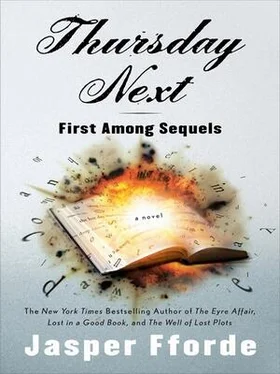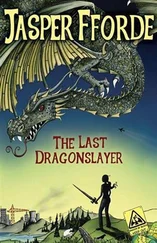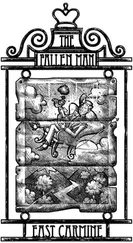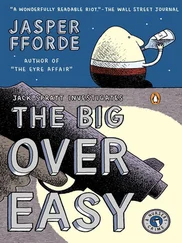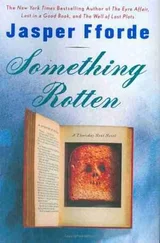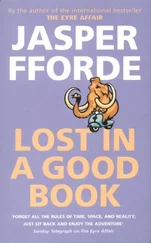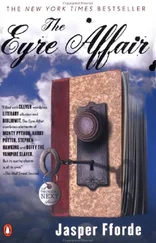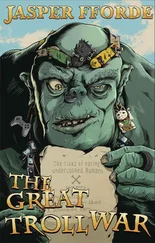Lady Cavendish shrugged and nodded her agreement.
“Item Six,” said Bradshaw, consulting his clipboard again, “Falling Outlander ReadRates.”
He looked at us all over his glasses. We all knew the problem but saw it more as a systemic difficulty rather than something we could deal with on a book-to-book policing basis.
“The Outlander Reading Index has dropped once again for the 1,782nd day running,” reported Bradshaw, “and although there are certain books that will always be read, we are finding that more and more minor classics and a lot of general fiction are going for long periods without even being opened. Because of this, Text Grand Central is worried that bored characters in lesser books might try to move to more popular novels for work, which will doubtless cause friction.”
We were all silent, and the inference wasn’t lost on any of us: The fictional characters in the BookWorld could be a jittery bunch, and it didn’t take much to set off a riot.
“I can’t say any more at this point,” concluded Bradshaw, “as it’s only a potential problem, but be aware of what’s going on. The last thing we need right now is a band of disgruntled book-people besieging the Council of Genres demanding the right to be read. Okay, Item Seven: The MAWk-15H virus has once again resurfaced in Dickens, particularly in the death of Little Nell, which is now so uncomfortably saccharine that even our own dear, gentle, patient, noble Nell complained. I need someone to liaise with the BookWorld Communicable Textual Diseases Unit to deal with this. Volunteers?”
Foyle reluctantly put up his hand. Working for the BCTD on Bookviruses was never popular, as it required a lengthy quarantine on completion; most of Victorian melodrama was to some degree infected with MAWk-15H, and it was often blamed on Jurisfiction agents with poor hygiene.
“Item Eight: Jurisfiction recruitment. The percentage of recruits making it to full agent status is currently eight percent, down from twenty-two percent three years ago. I’m not saying that standards need to slip or anything, but Senator Jobsworth has threatened to force agents upon us if we can’t recruit, and we don’t want that.”
We all muttered our agreement. Just recently a few cadets had been making themselves conspicuous by their poor performance. None of us wanted to be understaffed, but then neither did we want the ser vice swamped with knuckleheads.
“So,” continued Bradshaw, “on the basis that poor training makes failed cadets, I want you all to think about giving them all a little more of your time.”
He put down his clipboard.
“That’s it for now. Do the best you can, keep me informed as to progress and, as regards health and safety, we’ve had the welcome news that you can ignore safety practices to save time, but you must complete the paperwork. Good luck, and…let’s be careful out there.”
Everyone started to talk among themselves, and after I told Thursday5 to wait at my desk, I threaded my way through the small gathering to speak to Bradshaw. I caught up with him as he was heading back to his desk.
“You want me to report on the Jane Austen refit?” I asked him. “Any par tic ular reason?”
Bradshaw was dressed as you might expect a colonial white hunter to dress: in a safari suit with shorts, pith helmet and a revolver in a leather holster. He didn’t need to dress like that anymore, of course, but he was a man of habit.
“That was mostly misdirection,” he asserted. “I do want you to take a gander, but there’s something else I’d like you to look at-something I don’t want Senator Jobsworth to know about, or at least not yet.”
Senator Jobsworth was the head of the Council of Genres and a powerful man. Politics within Jurisfiction could be tricky at times, and I had to be particularly diplomatic as far as Jobsworth was concerned-I often had to cross swords with him in the debating chamber. As the only real person in fiction, my advice was often called for-but rarely welcomed.
“What do you want me to do?”
Bradshaw rubbed his mustache thoughtfully. “We’ve had a report of something that sounds transfictional. ”
“Another one?”
It was the name given to something that had arrived from the real world-the Outland, as it was known. I was a transfictional, of course, but the term was more usually used to refer to something or somebody that had crossed over unexpectedly.
Bradshaw handed me a scrap of paper with the title of a book on it. “I feel happier with you handling it, because you’re an Outlander. Appreciate a woman who’s proper flesh and blood. By the way, how’s Thursday5 doing?”
“She isn’t,” I replied. “Her timidity will end up getting her killed. We had a run-in with a grammasite inside Lord of the Flies while dealing with the glasses problem, and she decided to give the Verbisoid the benefit of the doubt and a very large hug.”
“What type of Verbisoid? Intransitive?”
I shook my head sadly. “Nope. Ditransitive. ”
Bradshaw whistled low. He hadn’t been kidding over recruitment troubles or Senator Jobsworth’s involvement. Even I knew there were at least three totally unsuitable candidates Jobsworth was pressuring us to “reappraise.”
“She’s lucky to have a single verb left in her body,” said Bradshaw after a pause. “Give her the full three days before firing her, yes? It has to be by the book, in case she tries to sue us.”
I assured him I would and moved back to my desk, where Thursday5 was sitting on the floor in the lotus position. I had a quick rummage through my case notes, which were now stacked high on my desk. In a rash moment I’d volunteered to look at Jurisfiction “cold cases,” thinking that there would only be three or four. As it turned out, there were over a hundred infractions of sorts, ranging from random plot fluctuations in the Gormenghast trilogy to the inexplicable and untimely death of Charles Dickens, who had once lived long enough to finish Edwin Drood. I did as much as I had time for, which wasn’t a lot.
“Right,” I said, pulling on my jacket and grabbing my bag, “we’re off. Stick close to me and do exactly as I say-even if that means killing grammasites. It’s them or us.”
“Them or us,” repeated Thursday5 halfheartedly, slinging her felt handbag over her shoulder in exactly the same way as I did. I stopped for a moment and stared at my desk. It had been rearranged.
“Thursday?” I said testily. “Have you been doing feng shui on my desk again?”
“It was more of a harmonization, really,” she replied somewhat sheepishly.
“Well, don’t.”
“Why not?”
“Just…just don’t. ”
The BookWorld was a minefield for the unwary, so apprenticeships were essential. We’d lost more agents through poor training than were ever taken by grammasites. A foot wrong in the imaginatively confusing world of fiction could see the inexperienced Jurisfiction Cadet mispelled, conjugated or reduced to text. My tutor had been the first Miss Havisham, and I like to think it was her wise counsel that had allowed me to survive as long as I did. Many cadets didn’t. The average life expectancy for a raw recruit in BookWorld was about forty-seven chapters.
We stepped outside the colonnaded entrance of Norland Park and basked in the warmth of the sunshine. The story had long ago departed with the Dashwood family to Devon, and this corner of Sense and Sensibility was quiet and unused. To one side a saddled horse was leaning languidly against a tree with a hound sitting on the ground quite near it. Birds sang in the branches, and clouds moved slowly across the heavens. Each cloud was identical, of course, and the sun didn’t track across the sky as it did back home, and, come to think of it, the birdsong was on a twenty-second loop. It was what we called “narrative economics,” the bare amount of description necessary to create a scene. The Book-World was like that-mostly ordered, and without the rich texture that nature’s randomness brings to the real world.
Читать дальше
